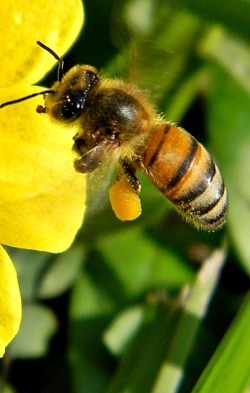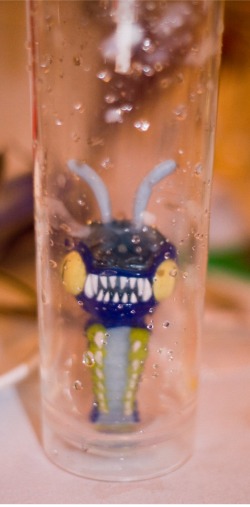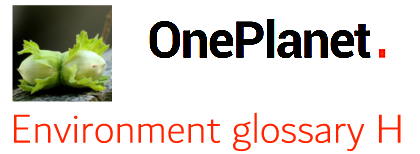OnePlanet is for people who speak English as a second or third language
A B C D E F G H I J K L M N O P Q R S T U V W X Y Z CLICK for list of all the words
H is for: |
: |
honey beeHoney bees (Apis mellifera mellifera) like to live in hollow trees, caves or piles of rocks, in groups of about 20,000 bees that all work together. Humans have probably been taking honey from wild bees for 50,000 years. There are prehistoric cave-paintings of people collecting honey. On the photo, note the yellow grains of pollen on the bee's leg. Photo by Bob Peterson, Creative Commons BY 2.0. |
 |
hubrisHubris (or hybris) is an ancient Greek concept. It's about a kind of pride or a kind of madness. It means being so arrogant and over-confident that you act as if you are a god. Naturally this annoys the gods, so they send a goddess called Nemesis to do something horrible to you. It reminds me of J Robert Oppenheimer, the Manhattan Project physicist who helped create the nuclear bomb. His team designed the first successful atomic bomb, which wwas exploded in July 1945 at the end of World War 2. In Europe, the war was already over. Japan was still fighting America, but wanted to stop. Everything about a massive nuclear fission reaction was theoretical, based on some tiny experiments in laboratories, and a lot of mathematics. Some of Oppenheimer's team thought it was possible that the chain reaction from an atomic bomb would continue until it had burned the entire atmosphere, killing everything on Planet Earth. Some of them thought there was no risk, others thought there was a serious risk. One calculated that the risk of killing everything on the planet was less than 1 chance in 3 million. (Well, that's OK then). The only reasons to create an atomic bomb were: (a) "Better dead than red" (the fear that communist Russia might do it first, and would then dominate America) (b) "Because we can" (the classic motivation of the mad scientist). Oppenheimer's team made the bomb anyway, because they could. Oppenheimer called the first atomic bomb test "Trinity", which seems to be a reference to the Holy Trinity of Father, Son and Holy Spirit. In an interview in 1965 he quoted from the Hindu Bhagavad Gita, saying "I am become Death, the destroyer of worlds". Oppenheimer thought his project gave him the power of a god. This usually ends with a visit from Nemesis. Scientists have, for many years, tried to make life in the laboratory. All they can do at present is change life, by selective breeding or by genetic manipulation. If we do create a new life form, we don't know what it will do. It could be (a) quite interesting if you're a scientist and/or (b) helpful and/or (c) extremely dangerous. A new form of life will have completely unknown abilities. It is not likely to be helpful, and could be catastrophic. It is hard to imagine anything more unnecessary or dangerous than creating artificial life; it's classic hubris. For more about the way mad scientists think, read the New Scientist magazine. About one-third of the articles are about responsible scientific projects to protect the environment, improve health and make a better world; one-third are strange, anthropocentric studies of things like comparing human nose shape with nationality; and one-third are absolutely mad "because we can" projects such as making humans immortal, or putting a giant sunshade between the Earth and the sun. Bwaha. Bwhahahaa! Bwahahahahaha!!! One final comment on the wonders of science: Hollywood films and the media give the impression that science can do almost anything, and will soon be able to do absolutely everything. In fact, the list of basic things that science can't do, or can't do without an impossible cost in money or energy, is enormous. Every leaf, every blade of grass, every microscopic life form and every insect does very important things that science can't do. We can't turn sunlight into sugar. We can't grow new human organs. We can't make meat, wood, wool or silk. We can't turn sea water into drinking water except at huge cost. We can't control the weather. We can't control species like kudzu after we introduce them to a new country. We can't recreate a species when it is extinct. We can't treat most psychiatric conditions. We can't treat many diseases (and antibiotics are getting less and less effective). We can't recycle most of the things we make. There is waste plastic in our food, our water, our bodies, on top of the Himalayas and in the deepest oceans. Without oil for pesticides, fertilisers, equipment, transport and storage we can't produce enough food for even half our current population, and there will be very little oil left by the end of this century. Image of little monster by Monkey Myshkin, CC BY 2.0 |
 |
...New words every week; CLICK HERE for a full list |
 |
* |
* |
A B C D E F G H I J K L M N O P Q R S T U V W X Y Z CLICK for list of all the words
